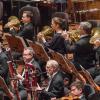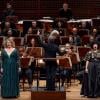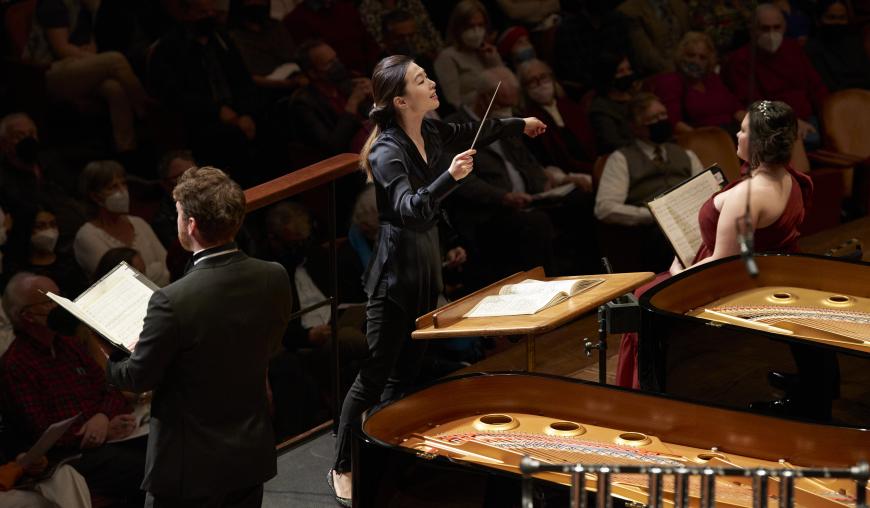
Incoming San Francisco Symphony Chorus Director Jenny Wong recalls the more-than-yearlong interview process with Music Director Esa-Pekka Salonen and the search committee that eventually led to her landing the position. “The Symphony was looking for somebody who would be mindful of the needs of the ensemble. The [SF Symphony] Chorus is unique. It is a hybrid of professional, paid singers and volunteers. They wanted someone who would be thoughtful toward the makeup of this chorus: vocally, where their experiences levels are, how one would go about the rehearsal process, and taking care of each person.”
Wong says singers come together for nothing more than their love of singing, and even on a macro level, she always remembers that any chorus is made up of individuals — with their own histories, lives, priorities, preferences, likes, imaginations, and ideas about what excites them or holds them back. “As chorus director, I never separate one approach from the other. There are so many things that can be solved, even technically, when the space created is one where every person has a place to belong and can bring their gifts into that space.”
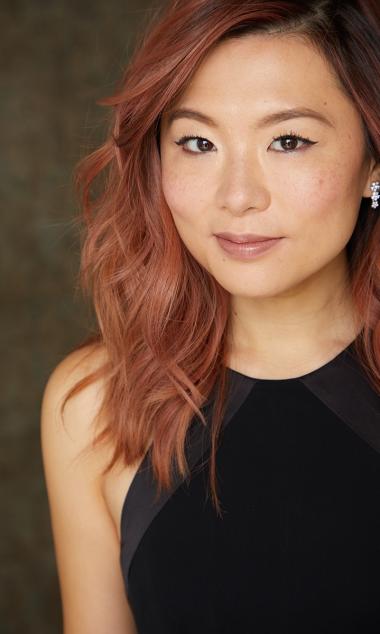
Wong, who also serves as associate artistic director of the Los Angeles Master Chorale, debuts in her new role with the SF Symphony this month. She will join Music Director Laureate Michael Tilson Thomas when he returns to Davies Symphony Hall Oct. 19–22 to conduct Beethoven’s Symphony No. 9. The concerts, featuring the SF Symphony and Chorus, also include soprano Angel Blue, mezzo-soprano Tamara Mumford, tenor Ben Bliss, and bass-baritone Dashon Burton.
SF Classical Voice spoke with Wong about the program, her repertoire for the upcoming season, and her philosophies, practices, experiences, and aspirations as a choral conductor in the 21st century.
Let’s begin with your rehearsal process for Beethoven’s Symphony No. 9 and the key components you have found in preparing the work that get the best results.
Beethoven’s Ninth needs no introduction. It’s one of the most widely performed pieces for a symphonic chorus. Musicians have varied and wonderful relationships with it. What I always try to inspire the musicians with is this wonderful setting of the text, which says, “Alle Menschen werden Brüder.” All people become brothers — and sisters [Wong adds to the quote]. The sense of the word all encapsulates the reason Beethoven wrote about joy. Everyone gets invited and is welcome into the celebration. With the chorus, it’s paramount we tell the same story the orchestra has been telling for the [prior] three movements. We must deliver the text in a way that is welcoming, jubilant, celebratory. We must give each section character so the music comes off the page and is something beyond those notes we all know.
What is your approach if the sound you hear from the chorus is flat, not celebratory?
As choral director, I can say specific, focused technical things, such as having consonants more front-ended, giving each note an accent. But I must make the chorus aware of the underlying subtext so that each chorister brings their own experience of joy. That’s the great thing about being vocal musicians: We’re not just inanimate instruments. Every person is a whole being. Singers must understand the cause for joy is that we’re all included. That matters way more than where we need to be articulation-wise. Intonation is [also] important. Especially with Beethoven’s Ninth, celebration is not everybody screaming at the top of their lungs. We’re looking for resonance in terms of vocal placement but also in listening to one another. One of many aspects I love to bring in is the importance of listening.
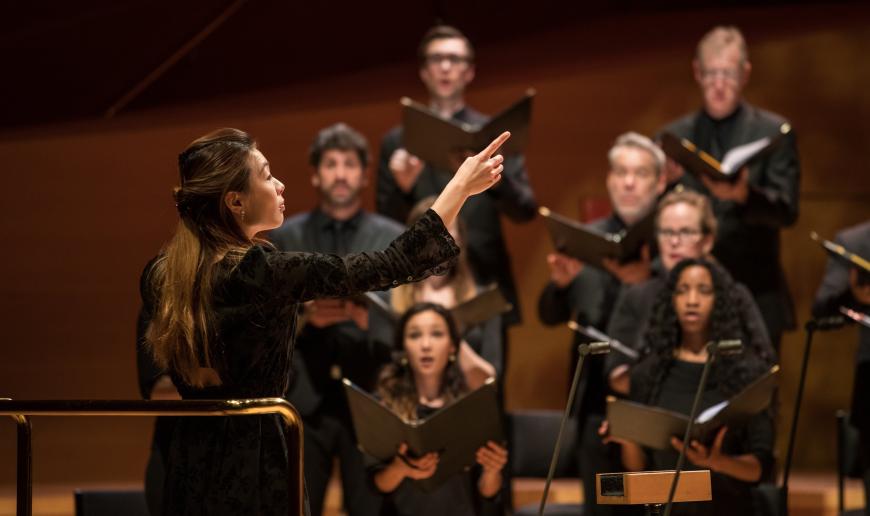
In what ways might listening be unique in the SF Symphony Chorus?
That’s one of the beauties of this chorus: the combination of people who have various experiences. Some singers have sung for the last 40 seasons, and some, this is their first season. The only way to come together … is that each singer becomes aware of others and what their role is in the larger whole. In today’s classical singing world, there are opportunities not just for soloists in operas or oratorios but for singers who excel in chamber or ensemble settings.
It’s no longer true that people who are better at singing in groups are less sophisticated than soloists. Growing up focused on vocal technique without listening to the tuning, timbre, vowels, and tone colors of others means group singing becomes just A plus B plus C. Instead, we encourage singers to really listen to what other parts are doing. Let’s say the tenors and basses have a motif in the march. That can mean my role as a soprano is to support them, not attack consonants as if I were in the foreground. That’s why I prioritize listening when others are singing. It makes people understand what, when, and why they are singing in the larger fabric. That applies to anything from Bach to [Kaija] Saariaho [and beyond].
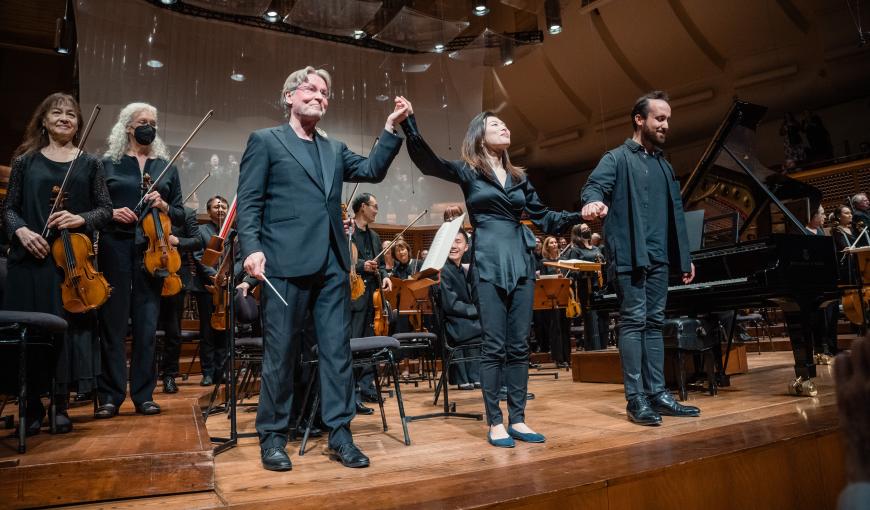
Please tell me about collaborating with orchestral conductors.
One of the most fun parts of this position is it’s what I interpret the music to be but also what I imagine all the possibilities can be. There’s no one fixed version of Beethoven’s Ninth. You can have 100 conductors, and there can be 100 outcomes. There’s always a plan A, my best guesstimate, and then I prepare for plans B and C. My job is to make sure the chorus is never taken completely by surprise. We’re always ready to be taken into a new realm. If we’re prepared, being on our toes becomes a fun thing. I used to play tennis, and this is a little bit related. It’s being prepared for how the person across from you serves the ball. We can guess, but it won’t be exact, so we must be nimble.
Looking forward in the season, what’s a particular work you are eager to take on?
Right off the bat, the largest is Les noces. It’s not the kind of music every chorus does. It has inherent challenges — the Russian language and intense, rhythmic passages — but it’s also [Igor] Stravinsky and incredibly well-crafted music. One thing that excites me most is that I enjoy a good challenge. It’s how we grow as musicians. If I only did things that I felt really comfortable doing, having done them 20–30 times, my skills would stay at a certain level.
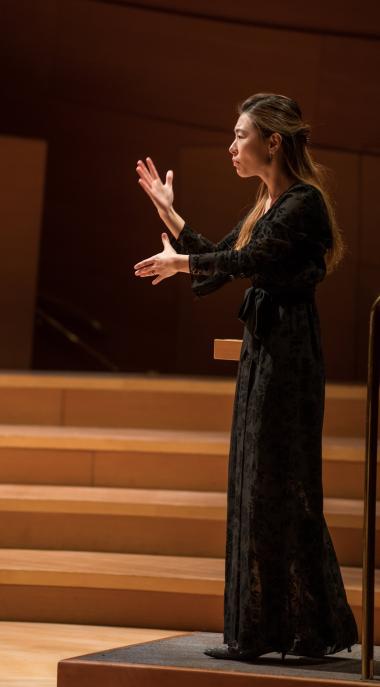
Having [Stravinsky’s] music — especially for our SF Symphony Chorus, with fantastic professional singers and many high-level volunteers, many of whom have day jobs and [for whom] Russian is not their first language — it is a good place to begin. We’ll build the expectation of what a new challenge is like. What might be intimidating could end up being most rewarding. That’s what I experienced last May and June while working with the [SFS] Chorus. The journey and getting to [better] know Esa-Pekka’s preferences feels like gold.
How has the pandemic changed the dynamics within choruses?
When we trust one another, we freely allow each other to sing and emanate joy. We are relearning what the performance arts and choral performance are. It’s not exactly the same as before. We’re all still grieving, healing, processing, and singing about these things. Why do we celebrate being together? It’s because for the last few years, we couldn’t. Even breathing together caused harm. Being able to sing together — I want to honor that by listening, helping each other feel safe and heard, and building a place for everyone’s gifts.
What works would you like to suggest for future SFS seasons?
Tan Dun’s Buddha Passion is a work I prepared the U.S. premiere for with the Los Angeles Philharmonic. It’s a concert-length work, very chorus-involved. It was a lot of Mandarin language. It was the first time in my professional career since coming from Hong Kong to the U.S. that I led a full chorus singing in one of my mother tongues. It connected all of my musical training in Western traditional classical music to my heritage. Knowing San Francisco has a large Chinese population, I could envision it being a rewarding, compelling experience.
There’s also Reena Esmail’s This Love Between Us, a piece I’ve come to love. She’s a thoughtful composer; this piece is for chamber orchestra and guitar player. Also, I’m a huge Peter Sellars fan, and projects [like his] that take us a step further out of what has traditionally been what a chorus sings like are what I’m most excited to explore.
Is there a moment from your early adult years that at the time seemed everyday but you now identify as pointing you in the direction you chose for a career?
One moment, in hindsight, happened in my freshman year, after I moved from Hong Kong to the U.S. I was not prepared for moving from a place where most of my friends looked like me to a place where I did not look like most people. In the dining hall at the University of Illinois [Urbana-Champaign], I had the distinct realization that I am now a minority. It was a terrifying feeling I’d never felt before.
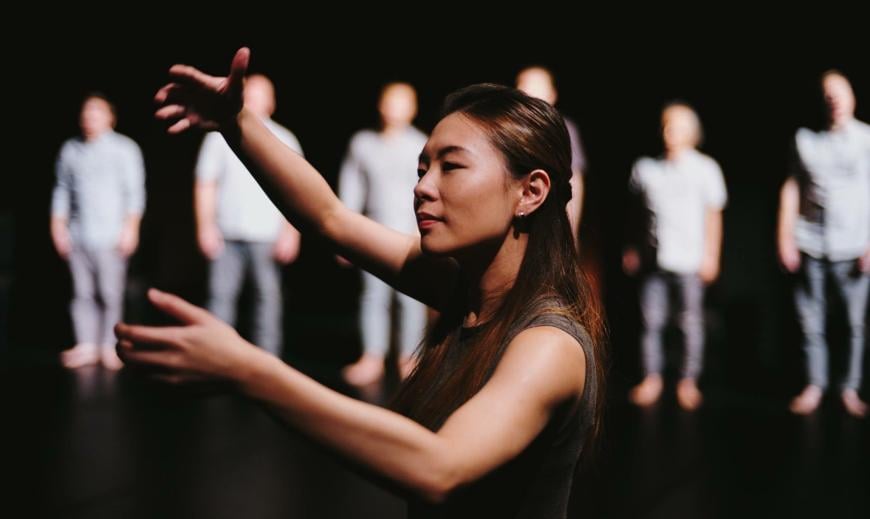
But in that moment, even when I felt terrified, choir was a place where I found it didn’t matter. They just saw me as a soprano. It was this kind of connected moment that has led me to always want to create that same environment for anyone who comes into a musical space with me. That’s what makes a chorus beautiful: We are all different.
Please share your perspective on the responsibilities and opportunities for today’s choral conductors who are women and people of color.
It’s always going to be an evolving question. On one hand, there is still a lot of room in conducting on a professional level for more women to be seen. [I recognize] that with every position I have, I want to make sure I do my best work so I reflect well on the communities I represent. At the same time, I just want to focus on my work. It can get noisy to dwell too much on the ways people are seeing me — as a woman, someone who is younger, a mother, Chinese.
I just want to do my best work, bring my whole being into the art and process, and champion and be an advocate for other people [who have] historically been excluded. Yes, I have had experiences where I felt disrespect or was heard differently because of what I stand for. No one should ever have to experience that, especially in a space where our goal is harmony. It’s best to focus on the possibilities of collaboration and harmony-making, not on negative aspects. Rather than how I’ve borne the brunt, I look at where I can lift up other people. That’s what I prefer.


